Strategic Orientations, Sustainable Supply Chain Initiatives, and Reverse Logistics: Empirical Evidence from an Emerging Market
Added on 2022-11-26
45 Pages14168 Words275 Views
International Journal of Operations & Production Management
Strategic orientations, sustainable supply chain initiatives, and reverse logistics: empirical evidence
from an emerging market.
Chin-Chun Hsu Keah-Choon Tan Suhaiza Hanim Mohamad Zailani
Article information:
To cite this document:
Chin-Chun Hsu Keah-Choon Tan Suhaiza Hanim Mohamad Zailani , (2016),"Strategic orientations, sustainable supply
chain initiatives, and reverse logistics: empirical evidence from an emerging market.", International Journal of Operations &
Production Management, Vol. 36 Iss 1 pp. -
Permanent link to this document:
http://dx.doi.org/10.1108/IJOPM-06-2014-0252
Downloaded on: 04 November 2015, At: 19:36 (PT)
References: this document contains references to 0 other documents.
To copy this document: permissions@emeraldinsight.com
The fulltext of this document has been downloaded 12 times since 2016*
Access to this document was granted through an Emerald subscription provided by emerald-srm:376953 []
For Authors
If you would like to write for this, or any other Emerald publication, then please use our Emerald for Authors service
information about how to choose which publication to write for and submission guidelines are available for all. Please
visit www.emeraldinsight.com/authors for more information.
About Emerald www.emeraldinsight.com
Emerald is a global publisher linking research and practice to the benefit of society. The company manages a portfolio of
more than 290 journals and over 2,350 books and book series volumes, as well as providing an extensive range of online
products and additional customer resources and services.
Emerald is both COUNTER 4 and TRANSFER compliant. The organization is a partner of the Committee on Publication
Ethics (COPE) and also works with Portico and the LOCKSS initiative for digital archive preservation.
*Related content and download information correct at time of download.Downloaded by UNIVERSITY OF MALAYA At 19:36 04 November 2015 (PT)
Strategic orientations, sustainable supply chain initiatives, and reverse logistics: empirical evidence
from an emerging market.
Chin-Chun Hsu Keah-Choon Tan Suhaiza Hanim Mohamad Zailani
Article information:
To cite this document:
Chin-Chun Hsu Keah-Choon Tan Suhaiza Hanim Mohamad Zailani , (2016),"Strategic orientations, sustainable supply
chain initiatives, and reverse logistics: empirical evidence from an emerging market.", International Journal of Operations &
Production Management, Vol. 36 Iss 1 pp. -
Permanent link to this document:
http://dx.doi.org/10.1108/IJOPM-06-2014-0252
Downloaded on: 04 November 2015, At: 19:36 (PT)
References: this document contains references to 0 other documents.
To copy this document: permissions@emeraldinsight.com
The fulltext of this document has been downloaded 12 times since 2016*
Access to this document was granted through an Emerald subscription provided by emerald-srm:376953 []
For Authors
If you would like to write for this, or any other Emerald publication, then please use our Emerald for Authors service
information about how to choose which publication to write for and submission guidelines are available for all. Please
visit www.emeraldinsight.com/authors for more information.
About Emerald www.emeraldinsight.com
Emerald is a global publisher linking research and practice to the benefit of society. The company manages a portfolio of
more than 290 journals and over 2,350 books and book series volumes, as well as providing an extensive range of online
products and additional customer resources and services.
Emerald is both COUNTER 4 and TRANSFER compliant. The organization is a partner of the Committee on Publication
Ethics (COPE) and also works with Portico and the LOCKSS initiative for digital archive preservation.
*Related content and download information correct at time of download.Downloaded by UNIVERSITY OF MALAYA At 19:36 04 November 2015 (PT)
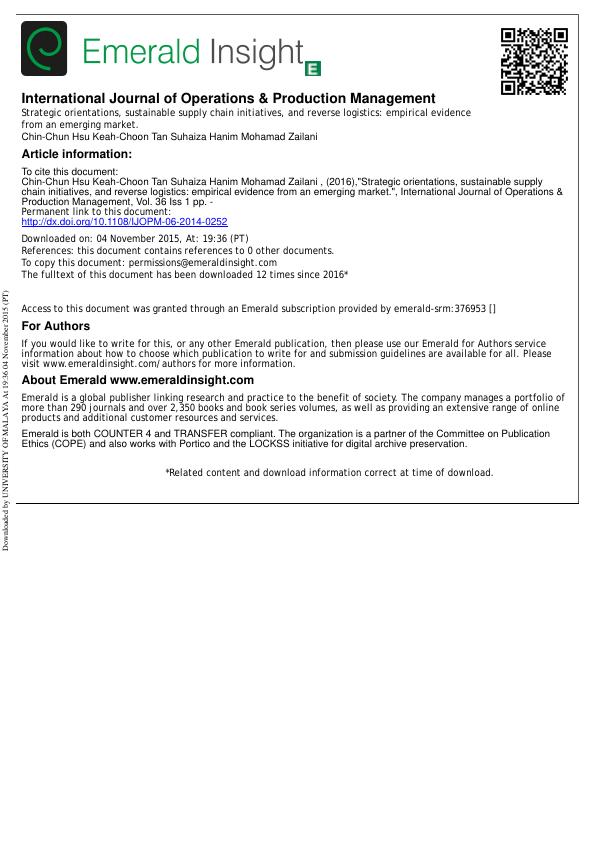
1 | P a g e
Strategic Orientations, Sustainable Supply Chain Initiatives, and Reverse
Logistics: Empirical Evidence from an Emerging Market
1. Introduction
Outsourcing trends since the early 1990s have transformed emerging countries into
significant players in the global economy. Global outsourcing thus has reshaped global supply
chain systems in significant ways, such that the globalized manufacturing network has shifted
manufacturing jobs to emerging countries, which providing new opportunities for improving
the economic development of emerging markets. But a globalized manufacturing network also
poses significant risks to individual health and safety, national economies, and local, regional,
and global environments (O’Rourke, 2005). Thus the question of whether manufacturing firms
in emerging countries can manage their profit growth and environmental sustainability goals
effectively has important implications at both national and global levels.
Sustainable business practices can help create wealth for firms and raise the standard of
living in emerging markets; unsustainable economic activities lead to environmental
degradation that can threaten an emerging country’s long-term prosperity and economic
competiveness (Schmidheiny, 1992). Firms in emerging countries might adapt ecologically
friendly strategies and guidelines from their business clients or competitors in more advanced
economies, though rapid business development and continuous environmental deterioration
also have increased the emphasis on environmental sustainability. In particular, environmental
concerns have prompted the governments of some emerging economies to regulate business
practices and set broad environmental improvement objectives (Child and Tsai, 2005). On theDownloaded by UNIVERSITY OF MALAYA At 19:36 04 November 2015 (PT)
Strategic Orientations, Sustainable Supply Chain Initiatives, and Reverse
Logistics: Empirical Evidence from an Emerging Market
1. Introduction
Outsourcing trends since the early 1990s have transformed emerging countries into
significant players in the global economy. Global outsourcing thus has reshaped global supply
chain systems in significant ways, such that the globalized manufacturing network has shifted
manufacturing jobs to emerging countries, which providing new opportunities for improving
the economic development of emerging markets. But a globalized manufacturing network also
poses significant risks to individual health and safety, national economies, and local, regional,
and global environments (O’Rourke, 2005). Thus the question of whether manufacturing firms
in emerging countries can manage their profit growth and environmental sustainability goals
effectively has important implications at both national and global levels.
Sustainable business practices can help create wealth for firms and raise the standard of
living in emerging markets; unsustainable economic activities lead to environmental
degradation that can threaten an emerging country’s long-term prosperity and economic
competiveness (Schmidheiny, 1992). Firms in emerging countries might adapt ecologically
friendly strategies and guidelines from their business clients or competitors in more advanced
economies, though rapid business development and continuous environmental deterioration
also have increased the emphasis on environmental sustainability. In particular, environmental
concerns have prompted the governments of some emerging economies to regulate business
practices and set broad environmental improvement objectives (Child and Tsai, 2005). On theDownloaded by UNIVERSITY OF MALAYA At 19:36 04 November 2015 (PT)
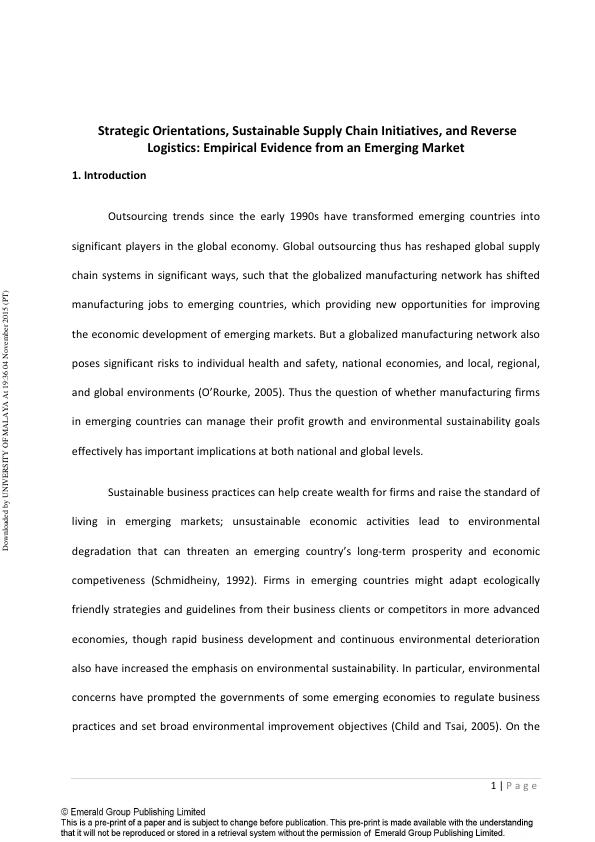
2 | P a g e
flip side, profit pressures and weak ecological traditions can decrease firms’ incentives to
address the broader range of stakeholder interests associated with sustainable practices.
In this context, we note three pertinent knowledge gaps. First, many studies have
focused on green business approaches in advanced economies, but much less research has
addressed the antecedents or outcomes of ecologically friendly business practices in emerging
markets (Blome et al., 2014; Fabbe-Costes et al., 2014). Second, despite the ongoing debate
about the potential outcomes of ecologically friendly supply chain activities (Prajogo et al.,
2014), the benefits or outcomes of sustainable supply chain initiatives are poorly understood
(Roehrich et al., 2014), though outcome measures are essential for managing and navigating
competitive global markets. In a related sense, surprisingly few empirical studies examine the
impacts on reverse logistics (Aitken and Harrison, 2013), despite their promise for creating new
value and providing competitive advantages (Jayaraman and Luo, 2007). Third, even when
ecologically friendly supply chain commitments make sense, managers lack guidelines for how
to start greening their firms’ supply chain efforts. A few prior studies identify external
“enablers,” derived from institutional or stakeholder theory (Zailani et al., 2012), but relatively
few cite strategically relevant factors. That is, research into sustainable supply chain initiatives
tends to pertain to organizational capabilities, not the strategic orientation antecedents that
precede the adoption of sustainable supply chain initiatives. By focusing on sustainability
practices, definitions, and decision frameworks, these studies ignore the need for insights into
how to develop sustainability strategies from an organizational perspective (Zhu and Sarkis,
2007). The fragmented, incomplete knowledge in this area thus fails to address adequately
which key strategic orientation forces will drive sustainable supply chain initiatives.Downloaded by UNIVERSITY OF MALAYA At 19:36 04 November 2015 (PT)
flip side, profit pressures and weak ecological traditions can decrease firms’ incentives to
address the broader range of stakeholder interests associated with sustainable practices.
In this context, we note three pertinent knowledge gaps. First, many studies have
focused on green business approaches in advanced economies, but much less research has
addressed the antecedents or outcomes of ecologically friendly business practices in emerging
markets (Blome et al., 2014; Fabbe-Costes et al., 2014). Second, despite the ongoing debate
about the potential outcomes of ecologically friendly supply chain activities (Prajogo et al.,
2014), the benefits or outcomes of sustainable supply chain initiatives are poorly understood
(Roehrich et al., 2014), though outcome measures are essential for managing and navigating
competitive global markets. In a related sense, surprisingly few empirical studies examine the
impacts on reverse logistics (Aitken and Harrison, 2013), despite their promise for creating new
value and providing competitive advantages (Jayaraman and Luo, 2007). Third, even when
ecologically friendly supply chain commitments make sense, managers lack guidelines for how
to start greening their firms’ supply chain efforts. A few prior studies identify external
“enablers,” derived from institutional or stakeholder theory (Zailani et al., 2012), but relatively
few cite strategically relevant factors. That is, research into sustainable supply chain initiatives
tends to pertain to organizational capabilities, not the strategic orientation antecedents that
precede the adoption of sustainable supply chain initiatives. By focusing on sustainability
practices, definitions, and decision frameworks, these studies ignore the need for insights into
how to develop sustainability strategies from an organizational perspective (Zhu and Sarkis,
2007). The fragmented, incomplete knowledge in this area thus fails to address adequately
which key strategic orientation forces will drive sustainable supply chain initiatives.Downloaded by UNIVERSITY OF MALAYA At 19:36 04 November 2015 (PT)
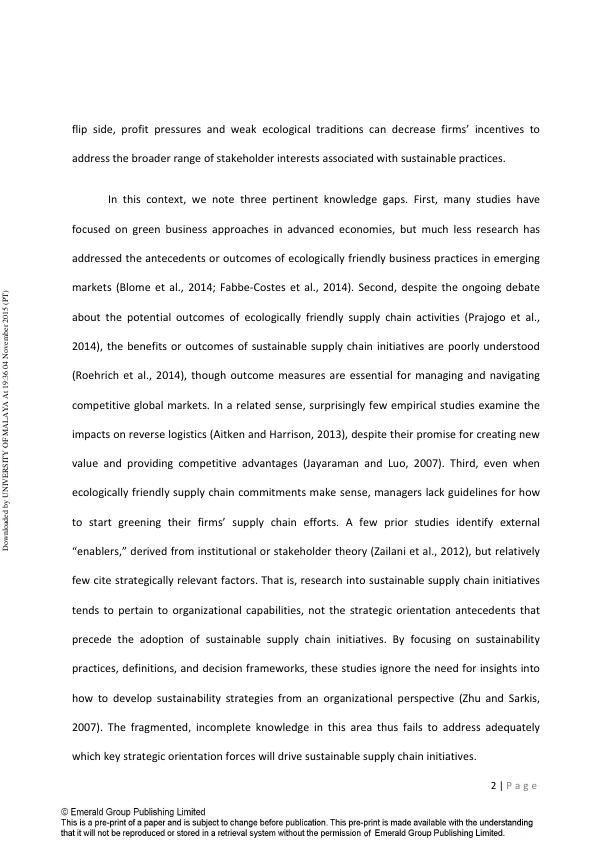
3 | P a g e
In attempting to fill these knowledge gaps, this study makes three primary contributions.
First, we study emerging economies. Some manufacturing firms identify and target segments of
ecologically conscious buyers, in an effort to position themselves as favorable green suppliers,
but most companies refuse to abandon their existing operations and production processes,
regardless of the growing interest in sustainability (Größler et al., 2013). Thus, manufacturing
firms in emerging countries must find ways to execute existing supply chain strategies through
sustainable initiatives that implement more ecologically friendly programs than appeared in
their past supply chain efforts. In particular, we study Malaysia, which is a member of
Association of Southeastern Asian Nations and an integral part of the global economy;
Malaysian suppliers have critical roles in global supply chains. The country represents an
important manufacturing hub for global firms that seek to outsource the manufacture of
component parts. The United Nations Conference on Trade and Development (UNCTAD)
reports that FDI inflows to Malaysia increased from US$9.1 billion in 2010 to US$11.9 billion in
2011, an increase of 30.8 percent (World Investment Report, 2012), which also raised
Malaysia’s rank to 13 from 16 in the list of Top Prospective Host Economies for 2013-2015
(World Investment Report 2013). Thus, the UNCTAD report affirms Malaysia’s attractiveness as
a foreign direct investment (FDI) destination. In this emerging economy, sustainable
development remains at an early stage, whereas profit maximization is the priority for most
manufacturing firms.
Second, we examine the reverse logistic effects of ecologically friendly purchasing,
manufacturing, and packaging programs (De Leeuw et al., 2013; Hsu et al., 2013). Sustainable
supply chain initiatives can deliver reverse logistic benefits; our empirical evidence even showsDownloaded by UNIVERSITY OF MALAYA At 19:36 04 November 2015 (PT)
In attempting to fill these knowledge gaps, this study makes three primary contributions.
First, we study emerging economies. Some manufacturing firms identify and target segments of
ecologically conscious buyers, in an effort to position themselves as favorable green suppliers,
but most companies refuse to abandon their existing operations and production processes,
regardless of the growing interest in sustainability (Größler et al., 2013). Thus, manufacturing
firms in emerging countries must find ways to execute existing supply chain strategies through
sustainable initiatives that implement more ecologically friendly programs than appeared in
their past supply chain efforts. In particular, we study Malaysia, which is a member of
Association of Southeastern Asian Nations and an integral part of the global economy;
Malaysian suppliers have critical roles in global supply chains. The country represents an
important manufacturing hub for global firms that seek to outsource the manufacture of
component parts. The United Nations Conference on Trade and Development (UNCTAD)
reports that FDI inflows to Malaysia increased from US$9.1 billion in 2010 to US$11.9 billion in
2011, an increase of 30.8 percent (World Investment Report, 2012), which also raised
Malaysia’s rank to 13 from 16 in the list of Top Prospective Host Economies for 2013-2015
(World Investment Report 2013). Thus, the UNCTAD report affirms Malaysia’s attractiveness as
a foreign direct investment (FDI) destination. In this emerging economy, sustainable
development remains at an early stage, whereas profit maximization is the priority for most
manufacturing firms.
Second, we examine the reverse logistic effects of ecologically friendly purchasing,
manufacturing, and packaging programs (De Leeuw et al., 2013; Hsu et al., 2013). Sustainable
supply chain initiatives can deliver reverse logistic benefits; our empirical evidence even showsDownloaded by UNIVERSITY OF MALAYA At 19:36 04 November 2015 (PT)
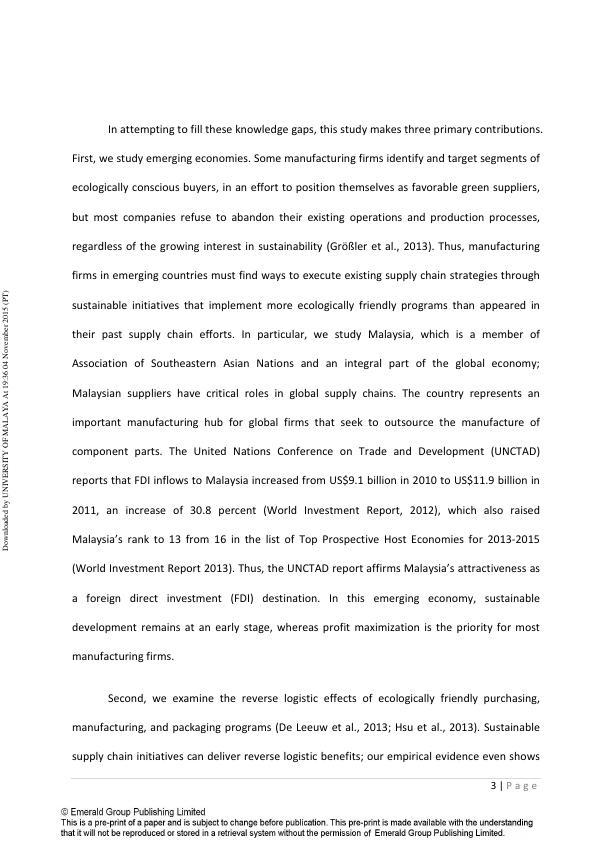
4 | P a g e
that firms can create competitive advantages for new value creation (Chavez et al., 2013).
Reverse logistics refers to returns of products or packaging, after their use, for reuse, recycling,
or reclamation of materials (Kapetanopoulou and Tagaras, 2011). By engaging in reverse
logistics, firms can recycle remanufactured parts or components, as well as dispose properly of
those components that cannot undergo remanufacturing or recycling (Lo, 2014). In turn, they
constitute a substantial cost-driving area and may result in greater profitability and customer
satisfaction, as well as benefitting the environment (Hsu et al., 2013).
Third, this study considers specific strategic orientation drivers that engender success in
sustainable supply chain initiatives. Specifically, we identify and empirically examine two new
strategic orientation factors that have been overlooked: eco-reputation and eco-innovation,
both of which integrate environmental concerns into the firm’s business strategies. This study
thus offers evidence of the critical role of eco-reputation and eco-innovation strategic
orientations in deploying sustainable supply chain initiative programs, as well as of their mutual
effects. Both antecedents may be important for understanding how firms respond to ecological
challenges and derive sustainable supply chain initiatives, but neither has been the subject of
prior research. We show that firms wishing to sustain their firm’s supply chain initiatives should
develop their eco-reputation and eco-innovation strategic orientations first.
In the next section, we present a theoretical framework for the strategic orientation
antecedents and reverse logistics outcomes of sustainable supply chain initiatives. Our research
hypotheses reflect input from a wide array of literature. We discuss the research methodologyDownloaded by UNIVERSITY OF MALAYA At 19:36 04 November 2015 (PT)
that firms can create competitive advantages for new value creation (Chavez et al., 2013).
Reverse logistics refers to returns of products or packaging, after their use, for reuse, recycling,
or reclamation of materials (Kapetanopoulou and Tagaras, 2011). By engaging in reverse
logistics, firms can recycle remanufactured parts or components, as well as dispose properly of
those components that cannot undergo remanufacturing or recycling (Lo, 2014). In turn, they
constitute a substantial cost-driving area and may result in greater profitability and customer
satisfaction, as well as benefitting the environment (Hsu et al., 2013).
Third, this study considers specific strategic orientation drivers that engender success in
sustainable supply chain initiatives. Specifically, we identify and empirically examine two new
strategic orientation factors that have been overlooked: eco-reputation and eco-innovation,
both of which integrate environmental concerns into the firm’s business strategies. This study
thus offers evidence of the critical role of eco-reputation and eco-innovation strategic
orientations in deploying sustainable supply chain initiative programs, as well as of their mutual
effects. Both antecedents may be important for understanding how firms respond to ecological
challenges and derive sustainable supply chain initiatives, but neither has been the subject of
prior research. We show that firms wishing to sustain their firm’s supply chain initiatives should
develop their eco-reputation and eco-innovation strategic orientations first.
In the next section, we present a theoretical framework for the strategic orientation
antecedents and reverse logistics outcomes of sustainable supply chain initiatives. Our research
hypotheses reflect input from a wide array of literature. We discuss the research methodologyDownloaded by UNIVERSITY OF MALAYA At 19:36 04 November 2015 (PT)
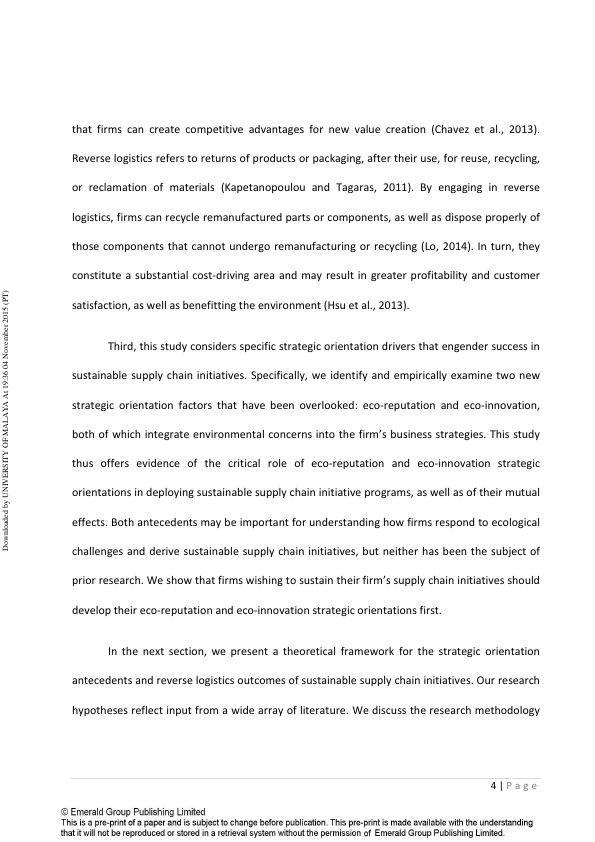
5 | P a g e
and the results of the data analyses. Finally, this article concludes by delineating the findings,
their managerial implications, and limitations.
2. Literature Review
2.1 Strategic Orientations
Strategic orientation originally stemmed from the market orientation notion, which was
a popular means to measure firm performance. According to Manu and Sriram (1996, p. 79),
strategic orientation refers to “how an organization uses strategy to adapt and/or change
aspects of its environment for a more favorable alignment.” Extended versions focus on
customer or technology orientations, and Narver and Slater (1990) argue that strategic
orientation is an critical component of profitability for both manufacturing and service
businesses, such that an orientation influences business decisions through its effects on
business profitability (Schniederjans and Cao, 2009).
According to strategic choice theory (Child, 1972), strategic decisions also have a
determining role in a firm’s business survival, and the fundamental issue is the strategic
orientation, with a foundational assumption that firms can enact and actively shape their
environments. Strategic choice theory centers on decision making in organizations designed to
achieve well-defined goals. Thus, managerial discretion, interpretation, and perspective have
great influence in strategic decision making, over the span of shared organizational actions. To
achieve organizational effectiveness, firms must make appropriate strategic choices that
“represent the competitive strategy implemented by a firm to create continuing performanceDownloaded by UNIVERSITY OF MALAYA At 19:36 04 November 2015 (PT)
and the results of the data analyses. Finally, this article concludes by delineating the findings,
their managerial implications, and limitations.
2. Literature Review
2.1 Strategic Orientations
Strategic orientation originally stemmed from the market orientation notion, which was
a popular means to measure firm performance. According to Manu and Sriram (1996, p. 79),
strategic orientation refers to “how an organization uses strategy to adapt and/or change
aspects of its environment for a more favorable alignment.” Extended versions focus on
customer or technology orientations, and Narver and Slater (1990) argue that strategic
orientation is an critical component of profitability for both manufacturing and service
businesses, such that an orientation influences business decisions through its effects on
business profitability (Schniederjans and Cao, 2009).
According to strategic choice theory (Child, 1972), strategic decisions also have a
determining role in a firm’s business survival, and the fundamental issue is the strategic
orientation, with a foundational assumption that firms can enact and actively shape their
environments. Strategic choice theory centers on decision making in organizations designed to
achieve well-defined goals. Thus, managerial discretion, interpretation, and perspective have
great influence in strategic decision making, over the span of shared organizational actions. To
achieve organizational effectiveness, firms must make appropriate strategic choices that
“represent the competitive strategy implemented by a firm to create continuing performanceDownloaded by UNIVERSITY OF MALAYA At 19:36 04 November 2015 (PT)
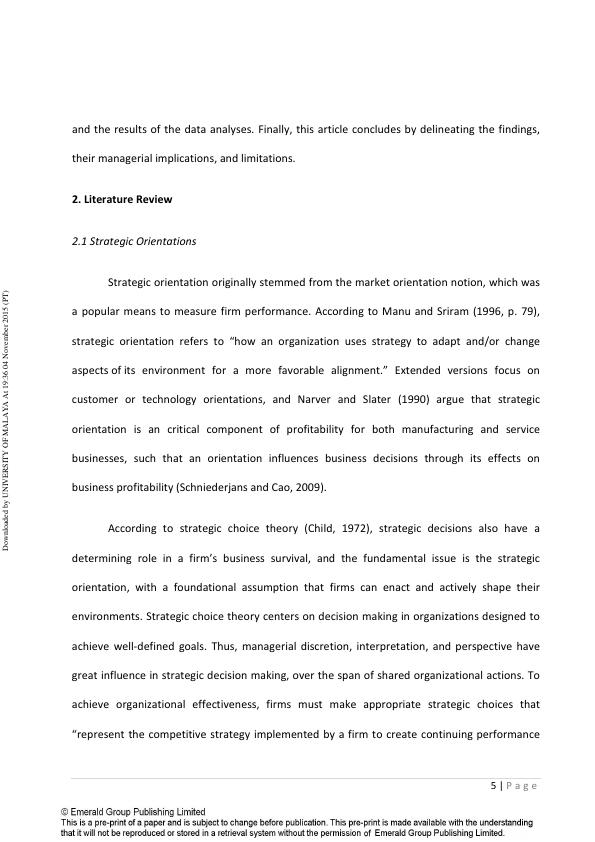
6 | P a g e
improvements” (Morgan and Strong, 1998, p. 1055). Ultimately a strategic orientation is a
firm’s overall direction and objectives, oriented toward an external business environment and
driven by top management (Voss and Voss, 2000). Strategic choice theory focuses on managers’
strategic choices when their firms face external challenges (Child, 1972). If they have a strategic
orientation, firms choose to leverage their strategy to adapt or change aspects of their external
environment to ensure more favorable alignment. It also helps explain why firms take proactive
and committed actions to address urgent issues such as sustainability.
Firms do not interact with their operating environments in identical ways. For example,
in the same industry, some firms focus on a narrow, limited, product-market domains, in an
effort to protect their market share. Others search continuously for new market opportunities
through innovation and new product development. Responses to the operating environment
reflect firms’ strategic orientations; strategic orientations largely their choices, establish their
strategic positioning, affect their performance, involve multiple functions, are highly complex
and ambiguous, and demand substantial resource commitments. In addition, a strategic
orientation choice refers to the process of choosing one course of action rather than another.
Thus a strategic orientation offers a means to comprehend the actions that firms take to
enhance their profitability and competitive advantage. This pattern of past, or intended,
decisions guides a firm’s ongoing alignment with its external environment and shapes strategic
policies and procedures (Hill and Cuthbertson, 2011; Minarro-Viseras et al., 2005).
From a sustainable supply chain perspective, firms’ strategic orientations are critical,
because sustainable business practices demand substantial firm resources and are technicallyDownloaded by UNIVERSITY OF MALAYA At 19:36 04 November 2015 (PT)
improvements” (Morgan and Strong, 1998, p. 1055). Ultimately a strategic orientation is a
firm’s overall direction and objectives, oriented toward an external business environment and
driven by top management (Voss and Voss, 2000). Strategic choice theory focuses on managers’
strategic choices when their firms face external challenges (Child, 1972). If they have a strategic
orientation, firms choose to leverage their strategy to adapt or change aspects of their external
environment to ensure more favorable alignment. It also helps explain why firms take proactive
and committed actions to address urgent issues such as sustainability.
Firms do not interact with their operating environments in identical ways. For example,
in the same industry, some firms focus on a narrow, limited, product-market domains, in an
effort to protect their market share. Others search continuously for new market opportunities
through innovation and new product development. Responses to the operating environment
reflect firms’ strategic orientations; strategic orientations largely their choices, establish their
strategic positioning, affect their performance, involve multiple functions, are highly complex
and ambiguous, and demand substantial resource commitments. In addition, a strategic
orientation choice refers to the process of choosing one course of action rather than another.
Thus a strategic orientation offers a means to comprehend the actions that firms take to
enhance their profitability and competitive advantage. This pattern of past, or intended,
decisions guides a firm’s ongoing alignment with its external environment and shapes strategic
policies and procedures (Hill and Cuthbertson, 2011; Minarro-Viseras et al., 2005).
From a sustainable supply chain perspective, firms’ strategic orientations are critical,
because sustainable business practices demand substantial firm resources and are technicallyDownloaded by UNIVERSITY OF MALAYA At 19:36 04 November 2015 (PT)
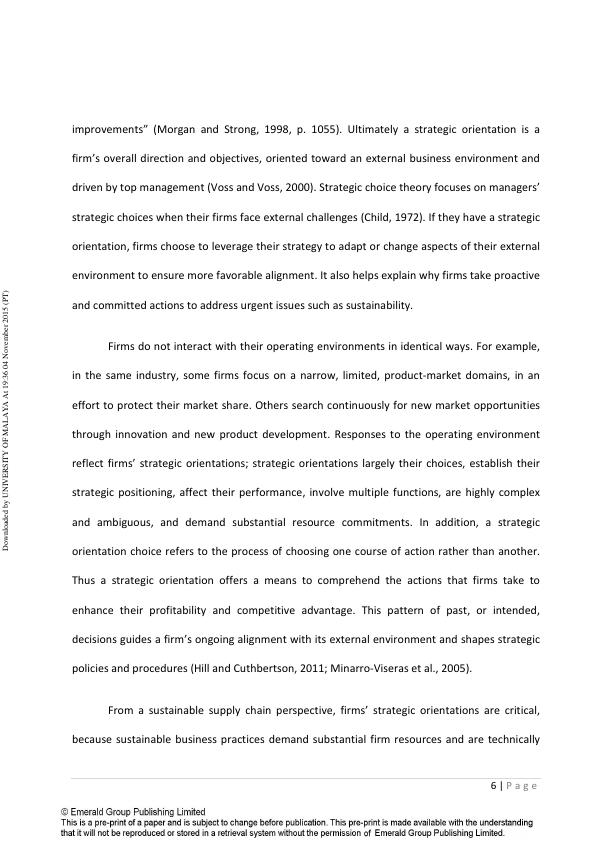
7 | P a g e
complex, such that they require diverse skills contributed by technical experts, organizational
experts, and top management (Saeed et al., 2014). From a strategic choice theory perspective,
Sharma (2000) examines how firms use freedom of choice (discretion, interpretation, and
perspective) to create strategies that influence firms’ orientation toward adopting sustainability
initiatives. Ketchen and Hult (2011) cite strategic choice theory as appropriate for studying
strategic supply chain management. With its focus on the best value, strategic choice theory
seeks to identify supply chain models that can affect organizational outcomes and enact the
environment. Strategic choice theory centers on the intra-organizational level and the provision
of certain strategic capabilities (Ketchen and Hult, 2011). It also seeks to answers questions and
challenges in extant supply chain management research. Finally, a strategic orientation toward
sustainable business practices is influenced by various external agents, including suppliers,
governments, regulatory organizations, green social groups, and rapidly changing technology
(Shrivastava and Grant, 1985).
We examine two particular ecological strategic orientations: eco-reputation and eco-
innovation. An eco-reputation is a stakeholder’s overall perception of a company’s efforts on
environmental protection over time. This evaluation reflects each stakeholder’s experience of
the ecological commitment of the company, as well as images based on the company’s actions,
beyond simple compliance with government regulations (e.g., Chen, 2010). This definition is
consistent with Banerjee (2001), Banerjee et al. (2003), and Esty and Winston (2009). Eco-
innovation instead refers to the development of products and processes that explicitly account
for concerns about the natural environment in pursuit of the goal of sustainable development
and ecological improvements (e.g., Menon et al., 1999). Thus eco-innovation constitutes aDownloaded by UNIVERSITY OF MALAYA At 19:36 04 November 2015 (PT)
complex, such that they require diverse skills contributed by technical experts, organizational
experts, and top management (Saeed et al., 2014). From a strategic choice theory perspective,
Sharma (2000) examines how firms use freedom of choice (discretion, interpretation, and
perspective) to create strategies that influence firms’ orientation toward adopting sustainability
initiatives. Ketchen and Hult (2011) cite strategic choice theory as appropriate for studying
strategic supply chain management. With its focus on the best value, strategic choice theory
seeks to identify supply chain models that can affect organizational outcomes and enact the
environment. Strategic choice theory centers on the intra-organizational level and the provision
of certain strategic capabilities (Ketchen and Hult, 2011). It also seeks to answers questions and
challenges in extant supply chain management research. Finally, a strategic orientation toward
sustainable business practices is influenced by various external agents, including suppliers,
governments, regulatory organizations, green social groups, and rapidly changing technology
(Shrivastava and Grant, 1985).
We examine two particular ecological strategic orientations: eco-reputation and eco-
innovation. An eco-reputation is a stakeholder’s overall perception of a company’s efforts on
environmental protection over time. This evaluation reflects each stakeholder’s experience of
the ecological commitment of the company, as well as images based on the company’s actions,
beyond simple compliance with government regulations (e.g., Chen, 2010). This definition is
consistent with Banerjee (2001), Banerjee et al. (2003), and Esty and Winston (2009). Eco-
innovation instead refers to the development of products and processes that explicitly account
for concerns about the natural environment in pursuit of the goal of sustainable development
and ecological improvements (e.g., Menon et al., 1999). Thus eco-innovation constitutes aDownloaded by UNIVERSITY OF MALAYA At 19:36 04 November 2015 (PT)
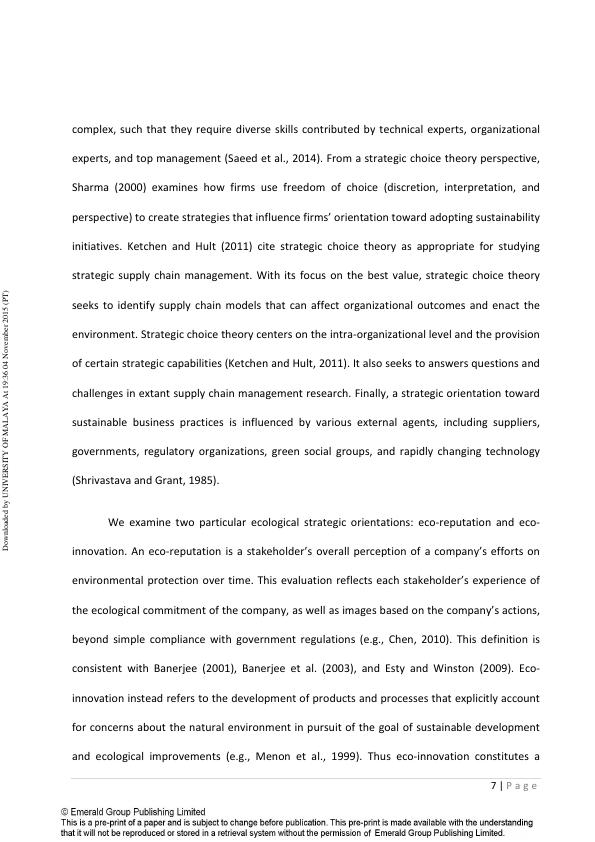
End of preview
Want to access all the pages? Upload your documents or become a member.
